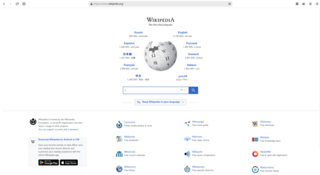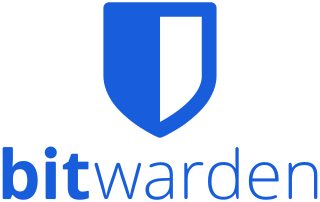
Mozilla Firefox, or simply Firefox, is a free and open-source web browser developed by the Mozilla Foundation and its subsidiary, the Mozilla Corporation. It uses the Gecko rendering engine to display web pages, which implements current and anticipated web standards. Firefox is available for Windows 10 or later versions, macOS, and Linux. Its unofficial ports are available for various Unix and Unix-like operating systems, including FreeBSD, OpenBSD, NetBSD, illumos, and Solaris Unix. It is also available for Android and iOS. However, as with all other iOS web browsers, the iOS version uses the WebKit layout engine instead of Gecko due to platform requirements. An optimized version is also available on the Amazon Fire TV as one of the two main browsers available with Amazon's Silk Browser.

GNOME Web, called Epiphany until 2012 and still known by that code name, is a free and open-source web browser based on the GTK port of Apple's WebKit rendering engine, called WebKitGTK. It is developed by the GNOME project for Unix-like systems. It is the default and official web browser of GNOME, and part of the GNOME Core Applications.

GNU IceCat, formerly known as GNU IceWeasel, is a completely free version of the Mozilla Firefox web browser distributed by the GNU Project. It is compatible with Linux, Windows, Android and macOS.

Midori is a free and open-source web browser. In 2019, the Midori project was acquired by the Astian Foundation. After the acquisition, the project became a derivative of the Firefox browser.
The following is a comparison of RSS feed aggregators. Often e-mail programs and web browsers have the ability to display RSS feeds. They are listed here, too.

Pale Moon is a free and open-source web browser licensed under the MPL-2.0 with an emphasis on customization. Its motto is "Your browser, Your way." There are official releases for Microsoft Windows, FreeBSD, macOS, and Linux.

Waterfox is a free and open-source web browser and fork of Firefox. It claims to be ethical and user-centric, emphasizing performance and privacy. There are official Waterfox releases for Windows, macOS, Linux and Android. It was initially created to provide official 64-bit support, back when Firefox was only available for 32-bit systems.
Firefox was created by Dave Hyatt and Blake Ross as an experimental branch of the Mozilla browser, first released as Firefox 1.0 on November 9, 2004. Starting with version 5.0, a rapid release cycle was put into effect, resulting in a new major version release every six weeks. This was gradually accelerated further in late 2019, so that new major releases occur on four-week cycles starting in 2020.
Mozilla is a free software community founded in 1998 by members of Netscape. The Mozilla community uses, develops, publishes and supports Mozilla products, thereby promoting exclusively free software and open standards, with only minor exceptions. The community is supported institutionally by the non-profit Mozilla Foundation and its tax-paying subsidiary, the Mozilla Corporation.

elementary OS is a Linux distribution based on Ubuntu LTS. It promotes itself as a "thoughtful, capable, and ethical" replacement to macOS and Windows and has a pay-what-you-want model. The operating system, the desktop environment, and accompanying applications are developed and maintained by elementary, Inc.

Emmabuntüs is a Linux distribution derived from Debian and designed to facilitate the restoration of computers donated to humanitarian organizations like the Emmaüs Communities.

uBlock Origin is a free and open-source browser extension for content filtering, including ad blocking. The extension is available for Chrome, Chromium, Edge, Firefox, Brave, Opera, Pale Moon, as well as versions of Safari before 13. uBlock Origin has received praise from technology websites and is reported to be much less memory-intensive than other extensions with similar functionality. uBlock Origin's stated purpose is to give users the means to enforce their own (content-filtering) choices.

Librem is a line of computers manufactured by Purism, SPC featuring free (libre) software. The laptop line is designed to protect privacy and freedom by providing no non-free (proprietary) software in the operating system or kernel, avoiding the Intel Active Management Technology, and gradually freeing and securing firmware. Librem laptops feature hardware kill switches for the microphone, webcam, Bluetooth and Wi-Fi.
Zstandard is a lossless data compression algorithm developed by Yann Collet at Facebook. Zstd is the corresponding reference implementation in C, released as open-source software on 31 August 2016.

KeePassXC is a free and open-source password manager. It started as a community fork of KeePassX.

Bitwarden is a freemium open-source password management service that stores sensitive information, such as website credentials, in an encrypted vault. The platform offers a variety of client applications, including a web interface, desktop applications, browser extensions, mobile apps, and a command-line interface. Bitwarden offers a free US or European cloud-hosted service as well as the ability to self-host.

Pop!_OS is a free and open-source Linux distribution, based on Ubuntu, and featuring a customized GNOME desktop environment known as COSMIC. The distribution is developed by American Linux computer manufacturer System76. Pop!_OS is primarily built to be bundled with the computers built by System76, but can also be downloaded and installed on most computers.

Q4OS is a light-weight Linux distribution, based on Debian, targeted as a replacement for operating systems that are no longer supported on outdated hardware. The distribution is known for an addon called XPQ4, which adds themes intended to replicate the look and feel of Windows 2000 and Windows XP.













